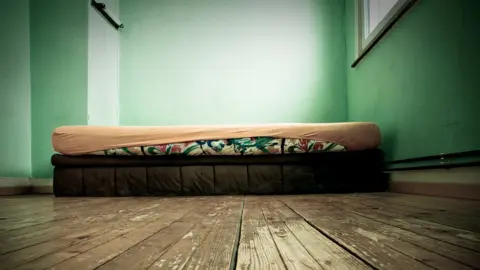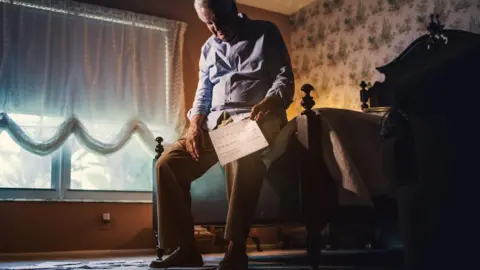One in 10 in serious debt 'have no bed'
 Getty Images
Getty ImagesOne in 10 clients of a debt charity have no bed to sleep in and eight in 10 say their financial situation leads to sleepless nights.
A review of visitors to Christians Against Poverty also found that three-quarters of them were afraid to open their post.
The charity said that the survey exposed the day-to-day realities of living with unmanageable debt.
The average debt of new clients seeking help last year was £14,298.
Among the practical effects of debt identified by the charity were:
- A third of clients having gone without at least one essential item, such as a washing machine, causing inconvenience and extra cost by visiting laundrettes and other services
- A fifth of those asked had rented or bought at least one item on hire purchase
- A fifth had no internet access, blocking them from cheaper deals on utilities such as energy
Some 91% of clients had used some form of credit to pay an essential bill or other debt.
This money was borrowed primarily from friends and family (64%), and credit cards (64%) followed by overdrafts (55%).
"This is an unsustainable solution that pushes the financial crunch point further down the line, but escalates the level of debt when this happens," the charity's annual review found.
"Shame, fear and believing no one can help cause clients to delay seeking help for two years on average. This extended period of financial hardship and worry sees living standards and mental health deteriorate as debts spiral out of control.
"This means seven in 10 end up behind with a priority bill and average debt levels hit more than £14,000 before clients get the help they need."
 Google
GoogleA separate survey of debt by financial services company True Potential suggested that debt tolerance was higher among men.
The average debt threshold, excluding mortgages, was £1,797, with men reaching debts of £1,960 before recognising it as a problem, compared with £1,645 among women. Adults under 25 reached £748 of debt before worries set in, compared with a figure of £2,299 among 45 to 54-year-olds.
"Personal debt is the elephant in the room. Consumer confidence and spending have been creeping up but there is growing concern that it is built on quicksand in the shape of rising individual debts. Underpinning this is easy access to debt, the costs of which are poorly understood," said managing partner David Harrison.
"But this is not just about people splashing cash they don't have. A big worry is the proportion of people needing debt just to get by. That's a bubble waiting to burst. The cost of living is 2.7% higher today compared to a year ago, adding an extra £468 to household bills."

'The floor was covered in rotting clothes'
In its report, Christians Against Poverty highlights the story of one of the charity's clients - Mark.
"My situation went downhill when my mental state deteriorated. I became anxious and depressed. I lost interest in life," he says.
"My studio flat fell into disrepair. It was dusty, dirty, full of broken furniture. The boiler didn't work. I slept on the floor. The bathroom pipes were broken and the floor was covered in rotting clothes. It was in an appalling state. I couldn't deal with the wreckage.
"I approached a number of services for help, but I never quite seemed to fit the category. I wasn't ill enough for one group, I wasn't drinking enough for another. So they kept referring me on and I became socially isolated.
"I had difficulties paying my mortgage, and I was in no position to work to earn the money to pay what I owed. It's fair to say I didn't know what my options were. I wondered if I'd be evicted and made homeless, if I'd have to kill myself. I wondered if I'd have to commit a crime so I could go to jail instead."
He says that the charity helped him start applying for jobs, to begin sorting out his debts and to put his flat on the market to avoid repossession.

Bank's concern
The City regulator - the Financial Conduct Authority (FCA) - and the Bank of England have warned of an acceleration in consumer borrowing, such as loans, overdrafts, credit card debt and car finance.
The FCA is already conducting is own inquiry into overdrafts, door-to-door lending and other forms of loans. Consumer groups have consistently argued there should be an overdraft cap in place.
A Lords committee also recently called for stronger controls such as a cap on "rent to own" products.
On Tuesday, the Financial Ombudsman Service said it had seen a nine-fold rise in complaints about payday loans in the last two years.
